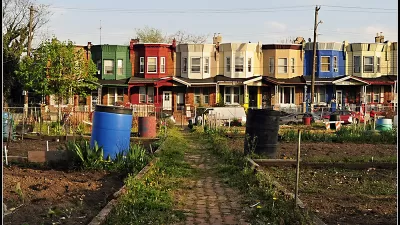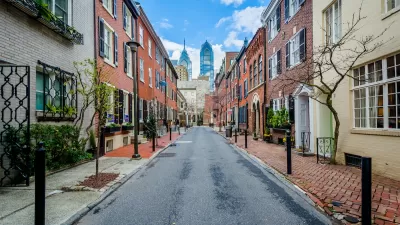Observers of Philadelphia’s economic and social situation can celebrate, and worry, given recent data on issues like poverty, crime, and the job market. One bright spot, however, is 2013's record number of building permits.
Larry Eichel reports for the philly.com regarding recent trends in Philadelphia that will inspire ambivalence among those invested in improving the fortunes of those that call the city home.
Among the best of the recent trends to come from the city, according to Eichel’s report, is a building boom in residential housing. “Last year, developers received building permits for 2,815 units of new residential housing, the most approved in a decade. Those units are worth an estimated $465 million, the highest annual amount on record.” Eichel speculates that the residential building boom is a result of the city’s seventh consecutive year of population growth, led especially by large numbers of millennials moving to the city (although a recent report claims evidence that Millennials won’t stay in the city for long).
Eichel, however, is definitely not espousing uncritical exuberance. In addition to the news about building permits, is some cold water about home sales: “annual home sales rose only a little, keeping them at less than half the prerecession peak. So the indicators on the residential housing front did not all point in the same direction.”
Eichel goes on to examine measures of poverty, employment, schools, and crime—which produce nothing but ambivalent findings. Success has been hard to sustain and what recovery exists is moderate. Eichel’s narrative fits the Philadelphia political leadership’s reasoning behind the its much-debated plans to build affordable housing.
FULL STORY: Philadelphia's future in the numbers

Alabama: Trump Terminates Settlements for Black Communities Harmed By Raw Sewage
Trump deemed the landmark civil rights agreement “illegal DEI and environmental justice policy.”

Study: Maui’s Plan to Convert Vacation Rentals to Long-Term Housing Could Cause Nearly $1 Billion Economic Loss
The plan would reduce visitor accommodation by 25% resulting in 1,900 jobs lost.

Planetizen Federal Action Tracker
A weekly monitor of how Trump’s orders and actions are impacting planners and planning in America.

Waymo Gets Permission to Map SF’s Market Street
If allowed to operate on the traffic-restricted street, Waymo’s autonomous taxis would have a leg up over ride-hailing competitors — and counter the city’s efforts to grow bike and pedestrian on the thoroughfare.

Parklet Symposium Highlights the Success of Shared Spaces
Parklets got a boost during the Covid-19 pandemic, when the concept was translated to outdoor dining programs that offered restaurants a lifeline during the shutdown.

Federal Homelessness Agency Places Entire Staff on Leave
The U.S. Interagency Council on Homelessness is the only federal agency dedicated to preventing and ending homelessness.
Urban Design for Planners 1: Software Tools
This six-course series explores essential urban design concepts using open source software and equips planners with the tools they need to participate fully in the urban design process.
Planning for Universal Design
Learn the tools for implementing Universal Design in planning regulations.
Caltrans
Smith Gee Studio
Institute for Housing and Urban Development Studies (IHS)
City of Grandview
Harvard GSD Executive Education
Toledo-Lucas County Plan Commissions
Salt Lake City
NYU Wagner Graduate School of Public Service





























